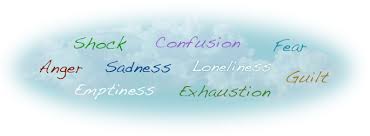514.223.5327
MAKE AN APPOINTMENTUnderstanding Grief
None of us are exempt from death and loss as it is a universal experience that touches every living thing. The experience of losing a loved one can feel devastating. Though there are some similar reactions to grief, each of us will experience our loss uniquely. One factor that impacts how we might experience a loss will be the nature of our relationship to the person who has died.
The grieving experience may fluctuate in intensity and frequency, very similar to the waves in the ocean. There might be moments when the wave of pain hits suddenly, fiercely, and can knock you off your feet for hours or days; then there might be times when the wave is gentle and lulls you into a subtle sadness that lingers underneath the surface momentarily as you might have a passing thought or memory of the person. You might experience a spectrum of emotions that include sadness, anger, confusion, overwhelm, anxiety, fear, and perhaps even relief. There are no right or wrong feelings to have when you lose someone as it is a personal experience for each individual. When we think of death, we often think of sadness, tears, and darkness. However, it is not the only way to grieve a loss. Many people find themselves wanting to celebrate the life of the person who has died rather than to focus on the absence of that person in their life.
In my experience working with clients who are bereaved, it is common to shift through various emotional states when working through the loss. One popular theory on the “stages of grief” is based on the work of Elizabeth Kubler Ross who outlines five stages that people commonly experience when dealing with the death of a loved one. You might move through the stages in varying sequences and at times revisit a stage depending on where you are in your own grieving process. Keep in mind that not everyone “has to” go through the stages and there is no right way or right amount of time to feel your grief. Grief is anything but linear.
1- Denial: The first reaction many people describe having is “this isn’t happening”. Even if we were aware that a person’s health is deteriorating and they will die, sometimes it is difficult for our mind to grasp the new reality of life without the person in it.
2- Anger: In this stage, thoughts such as “how could they leave me?”, “I can’t believe this is happening!”, and “Why?!” are typical. Feelings of anger and rage may surface when we realize that the person has died.
3- Bargaining: Attempts at pleading, hoping, praying, and wishing that the person has not died tend to occur in the bargaining stage. Thoughts like “if they can only live then I will never…” are typical in this stage.
4- Depression: Feelings of sadness and hopelessness arise in this stage as the reality of the loss begins to sink in deeper. It is common for people to have thoughts about suicide and their own death during this phase of grieving. It is very important to seek support if this occurs.
5- Acceptance: At the acceptance stage, the person begins to imagine their life and future without their loved one in it. There is a sense of hope that they can move forward while still carrying the memories of their relationship with the deceased in their minds. It is not about being happy or resigned about the death; it is an acceptance that they can’t change that the person is gone but they can still live their life with the loss that they have experienced.
We never “get over” the death of someone we love. Understanding grief is to understand that all we can do is to work through the pain when it resurfaces like the waves of the ocean come and go, reminding us that it is still there.
If you or someone you know are dealing with grief, feel free to call us to get support at 514 223 5327.
Written by Marianne Chivi, M.A., C.O.

